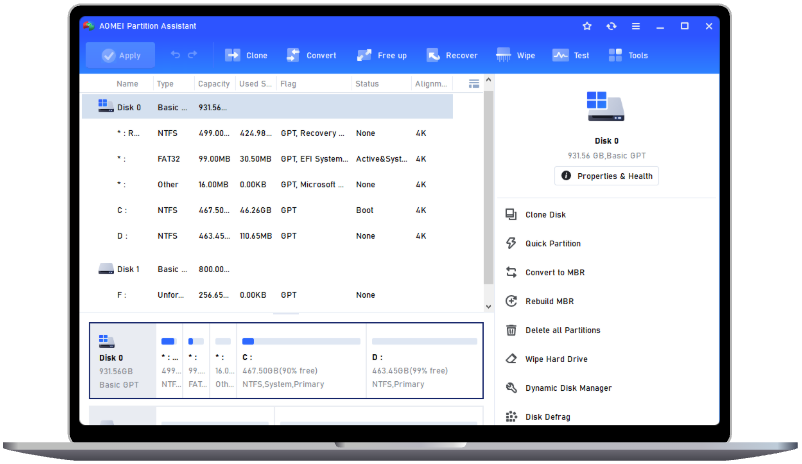2 Methods of Replacing Hard Drive on Windows 10 without Reinstalling Windows
If you are looking forward to replacing hard drive Windows 10 with a larger one or a new one but don’t want to reinstall OS from scratch, you can try the two methods on this page. Either of them can help you upgrade the hard drive without reinstallation in Windows 11, 10, 8, 7.
Why replacing hard drive on Windows 10?
Actually, there are many users looking to replace the hard drive in Windows 10/11 computer for one or more reasons such as:
1. Replace bad/broken hard drive in Windows 10
Your current hard drive may have experienced a hardware failure and need to be replaced with a new one. Here is a case:
“I have a Dell XPS15 that was running Windows 10 but the hard drive has failed completely and needs replacing. How do I go about installing and activating Windows 10 on a replacement hard drive?”
2. Upgrade hard drive to a larger hard drive for more capacity
As time goes by, you will find that your hard drive is running slower and slower, and the C: drive is full, even the whole hard drive is lack of space. Thus, you need to upgrade hard drive with a larger one for storing more data.
3. Upgrade hard drive to SSD for faster write/read speed
Part of users would like to increase PC or OS running speed by upgrading hard drive to a faster SSD (solid-state drive). That’s because SSD has better properties - it is more stable and more faster than traditional HDD.
How do I replace laptop hard drive without reinstalling Windows?
To replace hard drive Windows 10/11, one of the most widely-used methods is to do a fresh clean install of Windows 10/11 on the new hard drive. But that requires you to reinstall other programs and applications as well. The whole process will be quite complicated and time-consuming.
So in order to replace or upgrade hard drive in Windows 10/11 without reinstalling Windows and apps, you had better try other different methods. Below are two different ways of replacing main hard drive on Windows 10/11 without reinstalling everything once again. Check them out and then choose one based on your needs.
Method 1. Using Windows 10 /11native backup application
Windows 10/11 users know that Windows 10/11 does include a legacy backup application. And you can use it to backup and restore system, so that you can replace hard drive Windows 10/11 without reinstallation.
※Precaution: Insert an empty USB with enough storage to hold Windows .
Step 1. Press Windows + R keys simultaneously, type Control Panel. Under System and Security, click Backup and Restore (Windows 7). Then, you will get into Backup and Restore utility. Here you should click on Create a system image.
Step 2. Here you can start to create a system image. You will be asked “where do you want to save the backup”. Choose the just inserted USB drive, and click Next.
Step 3. Once the backup completes, it will display a message asking if you want to create a system repair disk. And indeed, you will need the system repair disk in order to reimage the computer. Thus, you need to follow the hints to create a system repair disk.
When you finished creating the system repair disk, disconnect the power from the PC to complete the new hard drive installation. After you correctly installed your new hard drive, follow the steps below to restore the system backup to the new disk for replacing the old hard drive in Windows 10/11.
Step 1. Restart your Windows 10/11 PC and boot from the system repair disk (USB drive).
Step 2. It will launch Windows Setup, click Next -> Repair Your Computer.
Step 3. When you get into a blue screen, choose Troubleshoot>System Image to launch System Image Recovery wizard. Tick Use the latest available system image and then click Next。.
Step 4. Choose the option to format and repartition hard disk. Then click Next > Finish > Yes to start to restore the system image to the new hard disk.
After all the operation, your computer will be reimaged. This way is kinda complex for Windows users especially for beginners. But fortunately, here we provide you another solution to replacing hard drive on Windows 10/11 more easily and conveniently.
Method 2. Replacing a hard drive without reinstalling Windows by third-party tool
It is no doubt that using the third party software can save a lot of trouble sometimes. If you want to replace failing system hard drive, or upgrade hard drive without any data loss or reinstalling everything on the current hard drive, you can use AOMEI Partition Assistant Professional.
This professional software can help you replace hard drive on Windows 11/10/8/7 without reinstalling OS and inside applications by cloning the hard disk. Moreover, you can boot your computer from the destination hard drive after clone. Here are the detailed steps on how to clone the system hard disk for hard drive replacement.
- ★Preliminary work:
- Connect the new hard disk to the computer via USB port and make sure it is recognized successfully.
- Ensure the hard disk has enough space to hold all data from the current hard drive. If not, you can delete or remove unnecessary programs or files on the original disk in advance.
- Check out the partition style of the old and new hard disk (MBR or GPT). If the partition style of the new disk is different from the old one, you can convert it to GPT or MBR beforehand. Or change boot mode (BIOS or UEFI) after clone.
- There is a Demo version for free download and trial.
Step 1. Install and launch AOMEI Partition Assistant, click "Clone" in the main interface and select "Clone Disk".
Step 2. Choose the hard disk that you need to clone as the source disk and click "Next".
Step 3. Select the destination disk to store the data on the source disk, and then click "Next".
Step 4. Then, you can check the source and destination disk in the next window or change to “Sector to Sector clone”, and click the "Confirm" button to continue if there is no problem.
Here, you can also click the "Settings" button to adjust the partition size on the destination disk or tick "4k alignment" to improve the reading and writing speed of SSD if the target disk is an SSD drive.
Step 5. At last, click "Apply" and "Proceed" in the main interface to start cloning the hard drive.
After cloning everything from the old hard drive to the new one, you can shut down the computer and install the new disk for replacement.
For desktop, it is easy to install a second hard drive because it is usually equipped with more than one hard drive bay. After installation, you need to enter BIOS to change boot priority, and move the cloned hard disk on the top one of the boot order.
But if you are replacing hard drive in Windows 10/11 laptop, things might become different as some laptop only one hard drive bay. In this case, you need to: Turn off your PC. Open the case, remove the old disk and put in the new hard drive, attach the cables and secure the drive with screws. Clone the case, turn on the power and it will boot from the cloned hard drive.
This is the whole process of Windows 10 replace hard drive with AOMEI Partition Assistant Professional.
Conclusion
Compared with two different ways, you may find that using AOMEI Partition Assistant Professional to replace hard drive on Windows 10 laptop or desktop is much easier than using Windows 10/11 backup application.
Actually, AOMEI Partition Assistant can not only allow you to copy entire hard drive from one to another, but also allow you to migrate OS only. And it has many other advanced features that can make up the shortages of Windows Disk Management, including converting disk between MBR and GPT without deleting volumes, allocating free space from one partition to another, splitting a large partition into two smaller ones.
What’s more, Windows Server users can try AOMEI Partition Assistant Server Edition.
FAQs about replacing hard drive Windows 10
1. Will I lose Windows if I replace hard drive?
If you just install a new disk on your Windows to replace your old hard drive, and wish to make it bootable, yes, you'll lose all data on the disk, and you'll need to reinstall a new Windows. The only way to keep all data is to clone hard drive to your new disk.
Cloning is to create a duplicate of the original disk. The cloned disk is just the same as the source disk. You don't need to reinstall OS and all apps and reset everything.
2. Can I replace HDD with SSD?
One of the greatest ways to increase PC performance is to replace a hard drive with a new SSD, which has a quicker boot time than an HDD. Simply clone the HDD to an SSD, attach it to your PC, and configure it to boot from the SSD.
3. Will Windows recognize a new SSD?
Before you can utilize a new SSD as a storage device, it must be initialized. The File Explorer or Disk Management tool will not identify a newly inserted SSD until it has been initialized.


